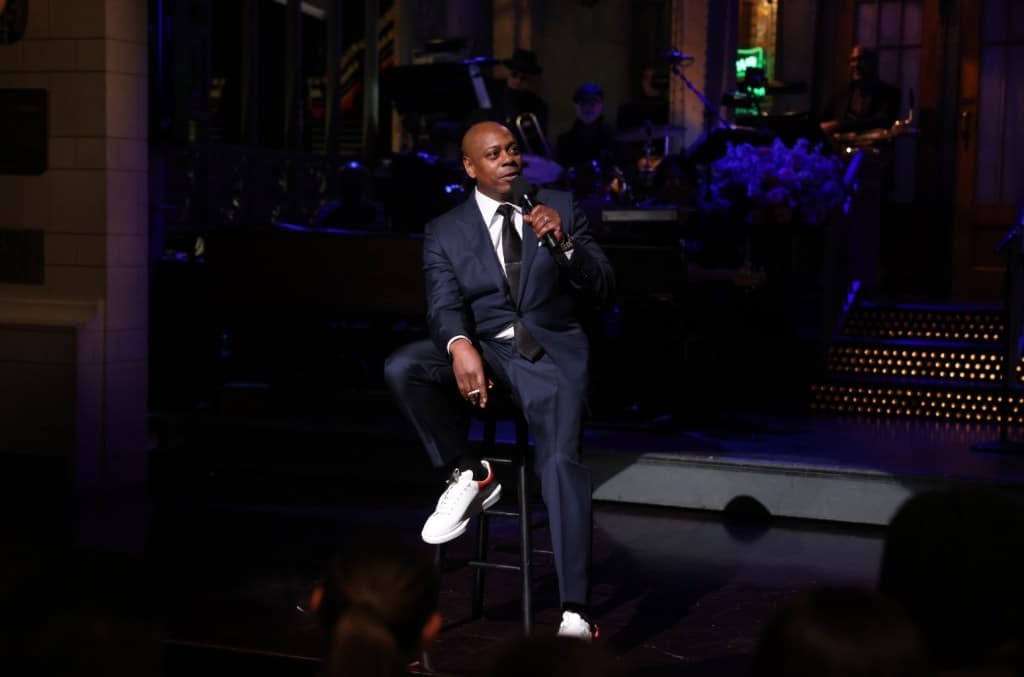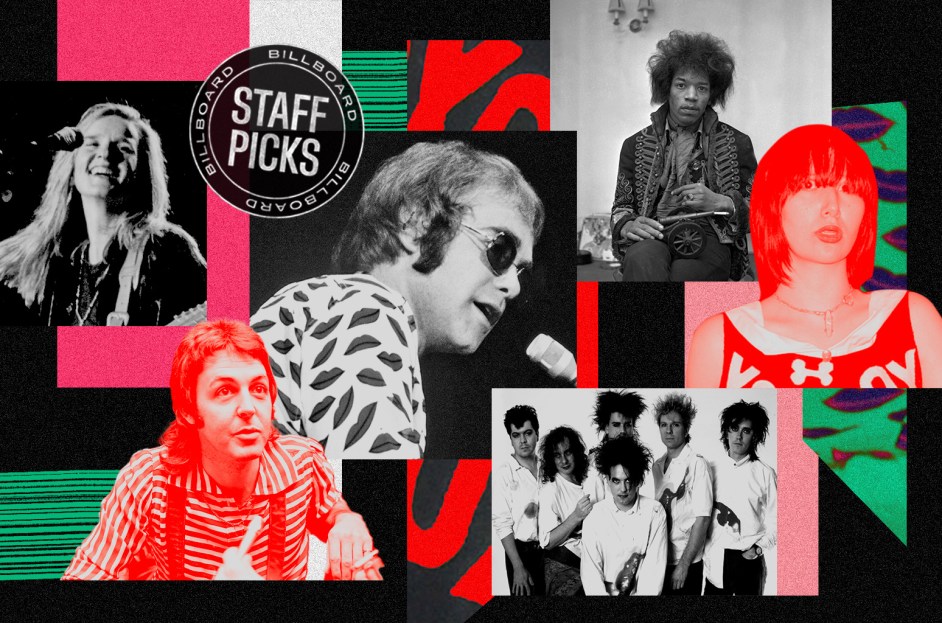
Melissa Etheridge, Paul McCartney, Elton John, Jimi Hendrix, Karen O of The Yeah Yeah Yeahs and The Cure
Jim Steinfeldt/Michael Ochs Archives/Getty Images; Evening Standard/Hulton Archive/Getty Images; Koh Hasebe/Shinko Music/Getty Images; Avalon/Getty Images; Theo Wargo/WireImage; Ross Marino/Getty Images
Rock may first and foremost be about sticking it to the man, as noted expert Ned Schneebly would tell you — but that doesn’t mean it doesn’t also have a softer, sweeter, more sentimental side. Rocking and rolling all night and partying every day is all well and good, but it would inevitably ring somewhat hollow without a Beth to sing about eventually coming home to. That’s what the hair metalers quickly discovered to be the necessary balance inherent in music as well as in life: When you release a new album, it’s always ass-kicking party-starting riffer first single, romantic power ballad second single.
With that in mind, our edit staff here at Billboard has crafted a list of the 50 best rock and roll love songs — in time for this Valentine’s Day, naturally — to get you in the proper gentle-rocking mood this swooning season. That’s not to say that it’s all slow songs, though: There have been plenty of classic up-tempo rock love songs that are fundamentally excited and set haywire by such waves of emotion. But yeah, we’ve got some classic lighter-wavers on here too, the kind that soundtracked your awkward school dances, your formative first kisses, maybe even a big question or two down the road.
Check out our list below, which spans six decades and countless different shades of rock love songs. And if you need the soundtrack from your upcoming Valentine’s Day plans, you can find a Spotify playlist with all 50 of them here — use it responsibly, and you’re welcome.
-
The White Stripes, “Fell in Love With a Girl” (2001)
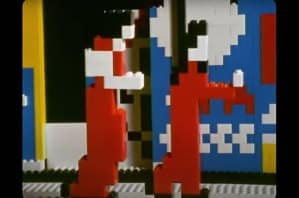
Image Credit: Courtesy Photo Love can confuse the best of us – even Jack White. “Sometimes, these feelings can be so misleading,” he yowls on “Fell In Love With A Girl,” even stepping back and observing, “My left brain knows that all love is fleeting.” But atop squalling power chords, he makes a sheepish admission that explains why, like most people, he keeps coming back: “She turns and says, ‘Are you alright?’ / I said, ‘I must be fine, ’cause my heart’s still beating.’” — ERIC RENNER BROWN
-
Dire Straits, “Romeo and Juliet” (1980)
“Oh, Romeo, yeah, you know I used to have a scene with him.” This retelling of Shakespeare’s tale by Dire Straits frontman Mark Knopfler is, like its inspiration, a masterpiece for the ages. An entrancing arpeggio on Knopfler’s National guitar introduces the star-crossed lovers (“Juliet, the dice was loaded from the start”) with allusions to The Angels (“singing, ‘hey, la, my boyfriend’s back’”) and West Side Story (“There’s a place for us, you know the movie song”). The song builds from the delicate piano lines of the E Street Band’s Roy Bittan to the dynamic drumming of Dire Strait’s own Pick Withers, as Knopfler declares, “I can’t do anything except be in love with you.” Breathtaking. — THOM DUFFY
-
The Hollies, “Bus Stop” (1966)
A love song presented as a one-set drama, penned by pop scribe Graham Gouldman with help from his playwright father Hyme: Hollies singer Allan Clarke waits at a rainy bus stop with his intended, sharing his umbrella and annoying all their fellow public-transportation users with their bantering. Over sweetly chiming guitars, the song perfectly captures the way even such nondescript romantic interludes can have us composing grand dramas in our heads — where just talking about recent shopping expeditions leads to thoughts of marriage proposals — though Clarke isn’t totally making something out of nothing here, at least if you believe his claims that “by August, she was mine.” — ANDREW UNTERBERGER
-
TV on the Radio, “Will Do” (2011)
Released nine days after Valentine’s Day 2011 as the lead single from the Brooklyn band’s Nine Types of Light, “Will Do” unfurls in dreamlike fashion, with its music box intro and wave crashes of synth creating a vibe akin to floating. While it’s unclear whether this dream is sweet or haunted, vocalist Tunde Adembipe offers acts as a clear-eyed guide through it by gently reminding his unnamed object of affection — a person apparently in another, lesser relationship — that “I’ll be there to take care of you if ever you should decide, that you don’t want to waste your life in the middle of a lovesick lullaby,” which the song itself cleverly mimics with its childlike opening. — KATIE BAIN
-
.38 Special, “Caught Up in You” (1982)
With all the blood-rushing excitement you can hope for in its chugging guitars and over-excited vocals, .38 Special’s first Billboard Hot 100 top 10 hit perfectly captures the jumbled jubilation of a new infatuation, with the perfect combination of southern-rock muscle and new-wave excitement. The song keeps raising in intensity throughout its four and a half minutes — through an unexpectedly multi-part bridge and a head-swimming guitar solo — but never goes too far over the top, always grounded in that simply stated chorus: “I’m so caught up in you/ Little girl.” — A.U.
-
Liz Phair, “Supernova” (1994)
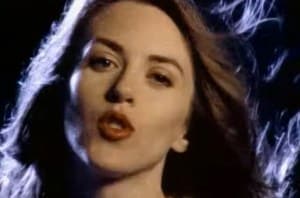
Image Credit: Courtesy Photo Most artists sing about romantic love or amorous love as if never the twain shall meet, but Liz Phair is not most. Her pounding “Supernova,” a rock chart and MTV hit from sophomore album Whip-Smart, celebrates the body and the brain in equal measure, with Phair’s propulsive fuzz guitar and smitten vocal delivery capturing the intoxicating elation of a relationship that’s explosive on every level. Plus, the couplet “And you f–k like a volcano / And you’re everything to me” is pure fire. — JOE LYNCH
-
Babasónicos, “Rubi” (2001)
A true gem in the band’s discography, Argentinian rock stars Babasónicos cast a spell with “Rubí.” An entrancing blend of dreamy rock instrumentation meld with seductive vocals to forge a path of romantic euphoria and desire. In the interlude, Frontman Adrán Dárgelos asks, “Does my gaze dazzle you?/ Or do you look under the belt?” — capturing the intoxicating mix of vulnerability and curiosity that defines newfound love and attraction. This potent musical alchemy transforms “Rubí” into a mesmerizing ode to lover’s enchantment. — ISABELA RAYGOZA
-
Prince & The Revolution, “I Would Die 4 U” (1984)
Few could sell seduction like Prince, so when his Purple Badness showed some vulnerability on a song, it hit even harder. Such is the case with “I Would Die 4 U,” a skittering synth-rock hit off Purple Rain that finds The Revolution flexing their instrumental precision and immaculate harmonies while Prince pledges his life to his paramour, packing what could be a grand romantic monologue into one simple, devoted declaration. — J. Lynch
-
Nine Inch Nails, “We’re in This Together” (1999)
The ominous lead single from the criminally underrated The Fragile isn’t your usual googly-eyed song about romance, but highlights surviving the darkest of times together, as illustrated by the anthemic chorus: “You and me/ We’re in this together now/ None of them can stop us now/ We will make it through somehow/ You and me/ If the world should break in two/ Until the very end of me/ Until the very end of you.” Though released in 1999, its message still feels relevant, considering the current state of affairs. — ANNA CHAN
-
King Princess, “1950” (2017)
On one level, King Princess’ breakthrough hit is a meditation on queer love and how it was able to be presented in public during a more regressive time in society. On another, “1950” is a piece of knockout pop-rock songwriting, with the complex layers of unrequited feelings leading towards the words “I’ll wait / For you,” Mikaela Straus’ rising and falling syllables letting the sentiment sway from side to side. — JASON LIPSHUTZ
-
Cheap Trick, “The Flame” (1988)
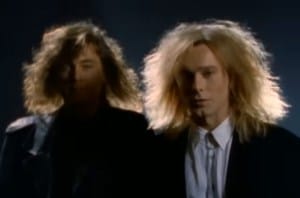
Image Credit: Courtesy Photo A sure way to piss off a diehard Cheap Trick fan is to profess love for “The Flame.” A sincere power ballad that was departure from the band’s cheeky, hard-charging guitar rock, the song was written by Bob Mitchell and Nick Graham, not Cheap Trick’s primary tunesmith, guitarist Rick Nielsen, and the band initially thought it was cringe. After Nielsen and bassist Tom Petersson walked out of an early attempt to record the track, producer Richie Zito smartly recorded frontman Robin Zander’s virtuoso vocals over a spare backing track. The result: a passionate and stirring vow of devotion that became Cheap Trick’s only Hot 100 No. 1, and a staple of wedding receptions. — FRANK DIGIACOMO
-
Gerry Rafferty, “Right Down the Line” (1978)
This 1978 soft rock classic effectively relays what anyone might want their lover to tell them: that they need your love, that they’ll never leave you, that they have no doubt about you and that in fact it’s always been you “right down the line.” The song’s unmistakable (and unmistakably ’70s) guitar work does nearly as much heavy lifting as Rafferty’s velvet-throated lyrics, melting hearts and creating a heady atmosphere before the piano-laced bridge breaks through like a warm ray of sunlight on bare skin. — K.B.
-
Modern English, “I Melt With You” (1982)
Such an iconic slice of swooning new-wave heaven that it was even used as the love theme for teen romance classic Valley Girl, “I Melt With You” was U.K. post-punks Modern English’s ticket to rock and pop immortality. Though its pre-apocalyptic vibes felt appropriate for an era under the perpetual threat of nuclear annihilation, the song ultimately shocks with its sentiments of clear-eyed optimism, particularly on that peerless bridge-breakdown declaration: “The future’s open wide.” — A.U.
-
Evanescence, “My Immortal” (2003)
Rock fans were already well aware of Amy Lee’s vocal power by the time Evanescence released “My Immortal” as the third single from their mega-selling debut album Fallen, but whereas preceding hits “Bring Me to Life” and “Going Under” boasted loud, major-key siren cries as hooks, this piano ballad hinges upon a more restrained performance, with Lee nursing her wounds through murmured verses and sweeping through the chorus with impressive nuance. — J. Lipshutz
-
REO Speedwagon, “Keep on Loving You” (1980)
“Keep on Loving You” may be a schmaltzy arena-rock ballad, but the lead-off single from REO Speedwagon’s 1980 breakthrough album Hi Infidelity perfected the genre. A relationship has gone bad, and singer Kevin Cronin, with his unmistakable tenor voice, pleads his eternal love with lyrics that demand a cigarette lighter-waving singalong. The piano intro, the soaring guitar solo, the grandiosity….it just works. If Billboard’s keen judgment isn’t enough, the fact that both Cigarettes After Sex and Dolly Parton recorded cover versions of the song should be enough to convince you. — GLENN PEOPLES
-
Bruce Springsteen, “Prove It All Night” (1978)
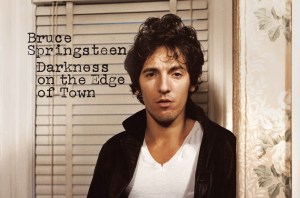
Image Credit: Courtesy Photo If love can be measured by the ferocity of an electric guitar solo then Springsteen’s “Prove It All Night” is certainly one of the most passionate songs in rock ’n’ roll. A simultaneous blast of piano and drums opens this track from Darkness on the Edge of Town with imagery of promises and urgency (“a gold ring and pretty dress of blue/ just one kiss will get these things for you”). Then the raw vocals give way first to Clarence Clemons’ sax, followed by Springsteen’s scorching guitar break — which in frequent extended live performances have made this song an ardent tour de force. — T.D.
-
Bloc Party, “I Still Remember” (2007)
A never-consummated love story, “I Still Remember” tells of an unspoken attraction between schoolboys that still reverberates in its narrator’s memory many years later. The lyrics of unfulfilled promise are heartbreaking — “You should have asked me for it/ I would have been brave” — but with its rushing bass and drums, gorgeously piercing guitars and Kele Okereke’s sweetly sighing (and still distinctly smiling vocals), you can tell that the memory remains a cherished one. — A.U.
-
The Rolling Stones, “Angie” (1974)
“Angie” opens up with a beautifully melancholy chord progression in A minor that has become iconic in rock music. The song resonates through the crisp, poignant strums of a steel-string guitar — played masterfully by Keith Richards. It stands out as a hauntingly evocative expression of loss and longing: “Everywhere I look, I see your eyes/ There ain’t a woman that comes close to you,” Mick Jagger belts out. Coupled with raw, heartfelt vocals, “Angie” remains an unforgettable ballad of vulnerability and unyielding nostalgia. — I.R.
-
Heart, “Crazy on You” (1975)
About four years after Helen Reddy’s “I Am Woman” became a soft-rock feminist anthem, the Wilson sisters delivered a blistering, guitar-driven banger that offered a provocative-for-its-time depiction of sexual liberation amid the tensions of the Vietnam War and Watergate. The narrator of “Crazy on You” is a woman and a mother, who wants to tune out the unrest with some “sweet flowing love” and won’t be refused. Powered by Ann’s scorching soprano, Nancy’s galloping acoustic guitar and high-voltage riffs by Roger Fisher and Howard Leese, “Crazy on You” was bold and sexy in an era when guys such as Paul Anka were topping the Hot 100 with prim bonbons like “(You’re) Having My Baby.” By cranking the desire dial up to 11, they created a late-20th-century classic about keeping the home fires burning.— F.D.
-
The Monkees, “I’m a Believer” (1966)
Few love songs make more out of the juxtaposition between their verses and choruses than the Neil Diamond-penned “I’m a Believer.” It’s all doom-and-gloom romantic fatalism on the former (“Love was out to get me… disappointment haunted all my dreams”), until the latter kicks off with a “Then I saw her face” and an organ riff that sounds like the lights being turned on. Suddenly, singer Mickey Dolenz is so inspired that he’s even rhyming “believer” with “couldn’t leave her if I tried,” another hard-won convert to the power of love. — A.U.
-
Foo Fighters, “Everlong” (1997)
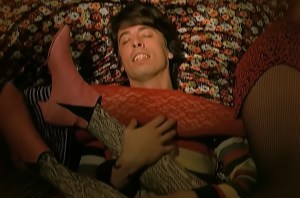
Image Credit: Courtesy Photo “Hello… I’ve waited here for you… everlong,” Dave Grohl begins his second band’s signature love song. Over tensely sparking guitars and rapid-fire drums, you can’t totally tell if he means it as a comfort or as a threat — and the song is so frazzled and scrambled that you’re not even sure if he knows himself. It’s not really until the cathartic chorus that you can really tell, though even then it’s still a little unsure of itself: “And I wonder as I sing along with you/ If anything could ever feel this real forever/ If anything could ever be this good again.” But isn’t the confusion and the wondering all part of the magic? — A.U.
-
Maná, “Eres Mi Religión” (2002)
Maná has made a rep for crafting some of the most heart-rending love songs in Latin rock balladry, and “Eres Mi Religión” is no exception. This compelling track beautifully illustrates the redemptive power of love, transforming personal desolation into a divine revelation. With its expressive electric guitar accompanying soul-stirring lyrics, the Guadalajara band transcends mere romance to explore love as a profound spiritual awakening. The song climbed to No. 17 on the Hot Latin Songs chart, marking another memorable milestone for Maná. — I.R.
-
Bryan Adams, “Heaven” (1983)
Canadian rocker Adams opened for Journey for 100 dates in 1983, so it’s understandable that he might have absorbed a little something from the band about writing a classic power ballad. It’s easy to hear how “Faithfully” inspired this one, with its nostalgic verses leading into the anthemic chords underlying the chorus (in a fun twist, Journey’s Steve Smith sat in on drums for the recording). Driven by Adams’ raspy, swoon-inducing “Baby you’re all that I want” refrains, “Heaven” went to No. 1 on the Hot 100 and now stands up to the dramatic best of the ’80s. — REBECCA MILZOFF SILVERMAN
-
The Police, “Every Little Thing She Does Is Magic” (1981)
The Police’s knotty, rhythmically complex-rock became completely untied for the first time in 1981, with a song about the difficulties of expressing love so universally understandable it could’ve been written by Smokey Robinson. While the verses and bridge are all about singer Sting’s difficulties telling his intended “of the feelings I have for her in my heart,” he manages to figure it out well enough in time for the explosive chorus: “Even though my life before was tragic/ Now I know my love for her goes on.” — A.U.
-
Bob Dylan, “Shelter From the Storm” (1975)
In the 50 years since its release, the lyrics to “Shelter From the Storm” have been analyzed with a focus and intensity often reserved for bible study. But while the song is indeed woven with religious symbology and esoteric double meaning, its ultimate message is obvious and universal: that good love functions as shelter. Given that the song is from Blood on the Tracks, commonly understood to be Dylan’s divorce album, the place of warmth and safety described here is lost by the last verse, with the singer wishing he “could only turn back the clock to when god and her were born.” But as anyone who’s found it knows, such shelter is a heavenly place to reside, even if temporarily. — K.B.
-
Fleetwood Mac, “You Make Loving Fun” (1977)
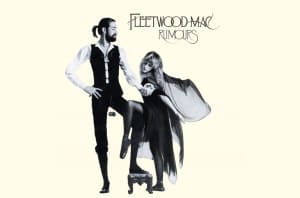
Image Credit: Courtesy Photo One could argue that “You Make Loving Fun” is a killer song about love, not a killer love song, but why nitpick about one of Christine McVie’s finest moments? Inspired by her affair following the separation from husband and bandmate John McVie, “You Make Loving Fun,” from 1977’s gem-filled album Rumours, finds McVie laying down a killer groove on a clavinet fed through a wah-wah pedal while singing about the the thrill of taking a new lover. “I never did believe in miracles,” she sings, “but I’ve a feeling it’s time to try.” Glad you did, Christine. — G.P.
-
The Cure, “Lovesong” (1989)
Robert Smith & Co. are here to disavow you of the silly notion that love songs have to sound happy with the Disintegration track that is exactly what its title declares – a love song — despite its gothy feel. As Smith has shared, the Hot 100 No. 2 hit was a wedding gift for wife Mary, and who wouldn’t say “I do” to lyrics such as “Whenever I’m alone with you/ You make me feel like I am whole again … However far away/ I will always love you”? — A.C.
-
Billy Joel, “Just the Way You Are” (1977)
Billy Joel’s Grammy-winner for both song and record of the year was so quickly and thoroughly stitched into the fabric of American pop culture in the late ’70s that it inevitably still elicits a good number of eye rolls generations later. But the song is unusually unsentimental for a pop standard: It’s not Joel singing about how the way you are is so incomparably wonderful, it’s just about how good or bad, the way you are is how he loves you — and he’d rather you not try and change that for any reason, least of all to please him. It’s not the stuff that Hallmark cards are made of, but it’s the stuff that real love has been built on forever. — A.U.
-
Café Tacvba, “Eres” (2003)
Café Tacvba showcases their remarkable range with “Eres,” a tender and poetic treasure from their album Cuatro Caminos. Renowned for their eclectic style, the Mexican band adopts a beautifully sincere acoustic-driven approach here. Describing devotion with touching simplicity — “Here I am by your side/ And I’m sitting here waiting until the end,” sings Emmanuel del Real — the song draws listeners into a deep emotional experience, making it one of the most revered love ballads in Latin alternative music. — I.R.
-
The Jimi Hendrix Experience, “May This Be Love” (1967)
Amidst all the psychedelic six-string eruptions that still make Jimi Hendrix’s debut album Are You Experienced? a truly sacred text for aspiring guitarists nearly 60 years later, the volume and tempo gets satisfyingly turned down about half way through for the gently crashing waterfalls of “May This Be Love.” It’s all the more knee-buckling for its unexpectedness — as brilliantly illustrated by its use in Cameron Crowe’s Seattle-set Singles, where Kyra Sedgwick’s and Campbell Scott’s characters are literally floored by it while playing records and quickly falling in love. — A.U.
-
The Smiths, “There Is a Light That Never Goes Out” (1986)
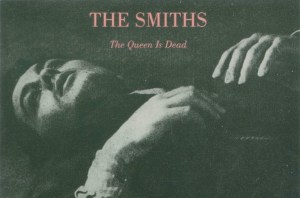
Image Credit: Courtesy Photo Never has a violent death under the wheels of a large automobile sounded so romantic. Like many of Morrissey’s greatest moments, the chorus of the Smiths’ best love song is both macabre and moving; when he sings, of a car crash, “to die by your side is such a heavenly way to die,” it’s practically Shakespearean. But the song’s verses set the stakes, as its narrator describes feeling alienated – and how the alienated can find refuge in romance. — E.R.B.
-
Foreigner, “I Want to Know What Love Is” (1984)
It wouldn’t work without those calmly plodding verses — singer Lou Gramm promising to take a little time to think things over, as he’s pushed forward by moody synths and supportive drums — setting the stage and building the tension. But of course, if you remember Foreigner’s megaballad for one thing, it’s the catharsis of that full-chested chorus declaration: “I want to know what love is/ I want you to show me.” After getting stuck at No. 2 for 10 week with the similarly gushing “Waiting for a Girl Like You,” the group clearly didn’t want to take any chances — even handicapping themselves with theater star Jennifer Holliday and the New Jersey Mass Choir of the GWMA for backing support — and the investment paid off: “I Want to Know What Love Is” became the group’s lone Hot 100 No. 1 in February 1985. — A.U.
-
INXS, “Never Tear Us Apart” (1987)
INXS needed a less loose-limbed love song to balance out all the breathy come-ons on 1987 global breakout set Kick, and they found an all-timer in fourth single “Never Tear Us Apart.” With sweeping strings, crashing drums, a couple fake endings and a sax solo that detonates like an atom bomb, the song is lush enough that singer Michael Hutchense’s impossibly simple declarations feel imbued with the wordplay and meaning of a thousand poets: “I was standing/ You were there/ Two worlds collided/ And they could never tear us apart.” — A.U.
-
Neil Young, “Harvest Moon” (1992)
Many songs focus on the early phases of a relationship when everything is new, exciting and fantastically lusty, but fewer artists have the authority to write about enduring romance. Neil Young was speaking from experience on “Harvest Moon,” the title track and only single from his 1992 folk rock masterpiece, released when Young was nearly 30 years into a relationship with this then wife, Pegi. The song shuffles and sways like a slow dance with a familiar and welcoming other as Young repeats that “I’m still in love with you” and the chords glow like they’re illuminated by the shimmering light of the moon itself. — K.B.
-
Blink-182, “All the Small Things” (1999)
Blink-182 became rock stars with a bunch of songs about being d–ks to their girlfriends and exes, but they crossed over to pop stardom with this song paying tribute to the little moments that make up a real love story: leaving roses by the stairs after a long day’s work, coming by for the rock show and commiserating afterwards, turning the lights off when it’s time to be carried home. And if those Small Things aren’t enough, the group also offers up one undeniably Big Thing in an all time “na-na, na-na” singalong chorus. — A.U.
-
Melissa Etheridge, “Come to My Window”
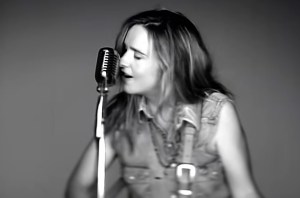
Image Credit: Courtesy Photo Melissa Etheridge’s first big hit since announcing to the world Yes I Am, “Come to My Window” shows her at the peak of her potency as both a singer and songwriter, every syllable of her howling by the light of the moon imbued with near-unstable amounts of lust and craving. The song’s inherent queerness is most obvious on the bridge — “I don’t care what they think/ I don’t care what they say/ What do they know about this love, anyway?” — but the yearning for quasi-forbidden love is palpable throughout, and impossibly electric. — A.U.
-
The Turtles, “Happy Together”
The Turtles came out of their folk-rock shell with “Happy Together,” a Billboard Hot 100 No. 1 that saw them embracing sunshine pop with blaring horns, elated harmonies and quiet-loud-quite song structure. Gen Z listeners are likely to draw a blank at the lyric “if I should call you up, invest a dime,” but anyone with ears and a pulse would be hard pressed to misunderstand (or resist) the magnificent, unbridled joy baked into every second of this blissful three-minute classic. — J. Lynch
-
Paul McCartney, “Maybe I’m Amazed” (1970)
Paul McCartney’s superpower as a songwriter was his continual ability to be inspired, awed and generally knocked the f–k over by the power of love: Throughout the decades, he continued to return to its wellspring with the same sense of humility and near-naivete in the face of its wondrousness. In that sense, his purest love song was his first as a solo artist: “Maybe I’m Amazed,” a McCartney deep cut that eventually became a live staple and radio regular, whose piano runs, guitar stabs and guttural vocal wails all convey the same sense of incredulity at being in the middle of something that five and a half decades later, Macca is still more than happy to not really understand. — A.U.
-
Pretenders, “I’ll Stand by You” (1994)
A genuinely beautiful, heart-rending ballad wasn’t what the world expected from rocker Chrissie Hynde in 1994. But, working with hit songwriting team Jim Kelly and Billy Steinberg (the scribes behind “True Colors” and “Eternal Flame”), she turned in one that felt genuine to her angsty spirit. Hynde’s haunting voice sounds lived in and a little sad as she pledges timeless devotion to someone who could be a lover (and yes, this song makes for a great old-school slow dance) — but could just as easily be a friend or family member, for whom love survives against all odds. — R.M.S.
-
Talking Heads, “This Must Be the Place (Naive Melody)” (1983)
On “This Must Be the Place,” David Byrne sings about falling in love and the stupefying bliss of new romance. He sings about staying in love until the end, and the daunting commitment that entails. But more than anything, the Talking Heads classic is about home – and how, no matter what station in life the listener is currently at, love can ground them and make them feel at peace. — E.R.B.
-
Elvis Presley, “Can’t Help Falling in Love” (1963)
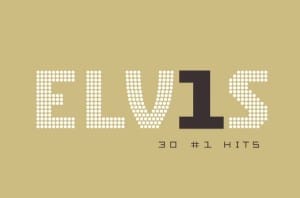
Image Credit: Courtesy Photo “Romantic” isn’t a word often associated with GnR’s music, and yet, the rock band known more for its edge and lyrics that some have criticized as misogynistic managed to show its softer, sweeter side with its only Hot 100 No. 1. From the iconic opening strains of Slash’s yearning guitar to Axl Rose’s croonings of treacly praise for then-girlfriend Erin Everly (“She’s got eyes of the bluest skies … Her hair reminds me of a warm safe place”), the Appetite for Destruction love anthem proves that sometimes, even the bad boys can get it just right. — A.C.
-
Patti Smith, “Because the Night” (1978)
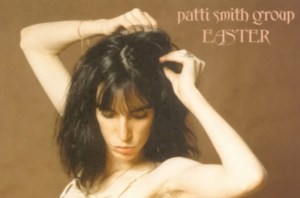
Image Credit: Courtesy Photo The powers of two of the most important and impassioned figures in rock history combined for one all-time nocturnal banger in 1978’s “Because the Night,” originally written by Bruce Springsteen but made entirely Patti Smith’s own for her third album Easter. Windswept piano, thunderous drums and a peerlessly tempestuous vocal raise the song’s temperature to a degree no other classic rock song can quite reach, as Smith tries her best to articulate the fire inside: “Come on now, try and understand/ The way I feel when I’m in your hands.” — A.U.
-
Paramore, “Still Into You” (2013)

Image Credit: Courtesy Photo Paramore’s signature banger from the band’s 2013 self-titled album is one of the most gushing, unabashed, high-adrenaline love songs of all time, regardless of genre – but its pummeling drums and Hayley Williams’ incomparable wail are both what make the song so great and solidify its place in rock’s heart-shaped canon. Delivered through fizzing verses and a rapturous chorus that just gets better and better each time, the message of “Still Into You” makes the stable, committed, do-chores-together-and-go-to-bed-early phase of love sound just as exciting as the first-touch rush or honeymoon-phase newness. — HANNAH DAILEY
-
Elton John, “Your Song” (1970)
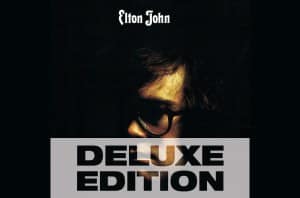
Image Credit: Courtesy Photo The best love song about the sheer difficulty of writing a good love song, Elton John and lyrics-writer Bernie Taupin make the absolute most out of trying their best in “Your Song,” helped by a timelessly sweet melody and the combination of John’s majestic piano playing and appropriately guileless vocal. Ultimately, all the crossed signals and stumbled proclamations of the song’s verses are paid off in the song’s eternal chorus statement: “I hope you don’t mind that I put down in words/ How wonderful life is now while in the world.” Multiple generations and countless covers later, no one’s really minded yet. — A.U.
-
Peter Gabriel, “In Your Eyes” (1986)
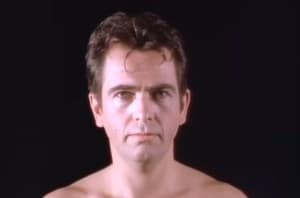
Image Credit: Courtesy Photo The perfect song smack in the middle of a pretty perfect album, Peter Gabriel’s So highlight “In Your Eyes” induces chills from its very first chords, and the first (and only) time the former Genesis frontman simply intones the word “love.” As his haunting, yearning voice at first sings of “this emptiness that fills my heart,” a slow increase in tempo and layered instrumentation builds to an exultant chorus about the kind of love in which “I am complete, “I see the doorways to a thousand churches,” and find “the resolution to all my fruitless searches.”
The language almost sounds a bit Shakespearean – and indeed, the song was immortalized in the equivalent of a Romeo and Juliet balcony scene in Say Anything, as John Cusack’s Lloyd Dobler hoists a boombox in the air to play it for his ex-girlfriend. Grand romantic gesture though that was, Gabriel intended the love “In Your Eyes” is about to be more ambiguous – perhaps romantic, perhaps spiritual or religious. But judging by his fondness for breaking out a tiny boombox at his own concerts now to signal he’s about to perform the song (still with bass player Tony Levin intoning the introductory “in your eyes” in his basso profundo), he’s made peace with the fact that nearly 40 years after its release, “In Your Eyes” is for, most listeners, the musical definition of romantic. — R.M.S.
-
The Cure, “Just Like Heaven” (1987)

Image Credit: Courtesy Photo The lush romantic sweep of “Just Like Heaven” is so overwhelming that The Cure needed to build to it one layer at a time in its intro: first the crashing drums and bass, then the sublime electric guitar, then the blood-rushing acoustic, and finally those soaring keys. And of course, it’s all stage-setting for the entrance of Cure frontman Robert Smith, beginning the song already in a frenzy that feels like it’s been going on for weeks: “‘Show me, show me, show how, you do that trick/ The one that makes me scream,’ she said/ ‘The one that makes me laugh,’ she said/ Threw her arms around my neck…”
“Just Like Heaven” saves its title for the very end, because you’ve already gotten the point long before: No other song by an alternative rock band has every used every instrument at its disposal to paint in such vivid and dazzling colors the full portrait of romantic wonderment. It’s ecstatic, it’s transportive, and it’s also more than a little bit tragic — and indeed, as the final verse devastatingly reveals, it’s all been a dream, of a girl who’s been stolen by the sea and “drowned… deep inside” the narrator’s heart. But that the memory of love is still powerful enough to conjure such feeling is the ultimate tribute to its power, and makes this “Heaven” one absolutely worth dying for. — A.U.
-
The Beatles, “Something”
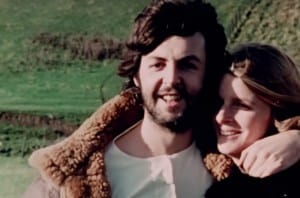
Image Credit: Courtesy Photo You can argue that a number of Beatles songs qualify as George Harrison’s finest recorded moments, but there is no doubt that “Something” is the finest composition he crafted during his time with the Fab Four (if not his entire life). Few rock ballads are simultaneously lush and muscular, but this Abbey Road highlight (and Hot 100 topper) pulls off that trick with elegance, authenticity and aplomb. Not long after its release, even an avowed Beatles-hater like Frank Sinatra was calling it “the greatest love song of the past 50 years” (even if he mistakenly credited it to Lennon-McCartney at first). — J. Lynh
-
Yeah Yeah Yeahs, “Maps” (2003)

Image Credit: Courtesy Photo Over the past 20 years, the cultural importance of Yeah Yeah Yeahs’ “Maps” has been largely divorced from its placement on the band’s 2003 debut album, Fever to Tell — but even now, its spot on the track list is telling of how startling the song’s tenderness remains. After eight tracks of riotous art-punk, with singer Karen O often spitting out her words with gleeful abandon, suddenly we get guitar feedback acting like a dinner bell, whomping drums ratcheting up the stakes, and O stripping away artifice and softly pleading for a partner to stay. Perhaps the YYYs’ anathema to straightforward rock construction made them the perfect band to deliver an all-time love song, the band’s quick-trigger impulses yielding a simple wallop: “Wait/ They don’t love you like I love you.” — J. Lipshutz
-
David Bowie, “Heroes” (1977)
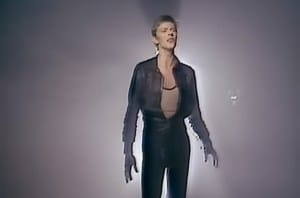
Image Credit: Courtesy Photo Bowie originally penned his enduring love song about two lovers in Germany separated by the Berlin Wall. But since its 1977 release, the song has taken on a life of its own – in no small part because the stakes Bowie passionately outlines on the song are relatable to any lovers who have faced challenges, not just ones imposed by geopolitics. The song’s instrumental – with visionary contributions by Brian Eno, Robert Fripp and Tony Visconti, among others – propels it forward as Bowie makes a rousing declaration: “We could steal time, just for one day / We can be heroes, forever and ever.” Even the most fleeting romance, Bowie understood, could be eternal. — E.R.B.

 State Champ Radio
State Champ Radio 



